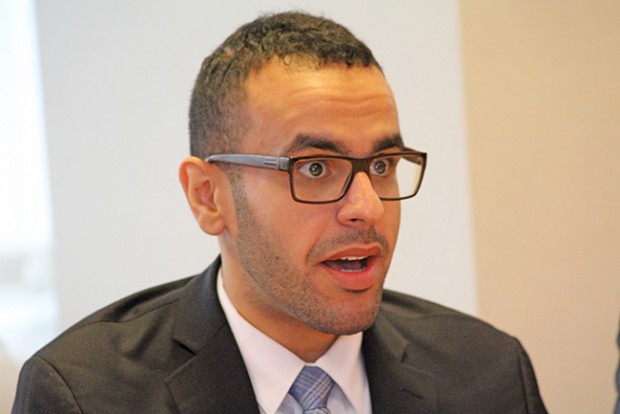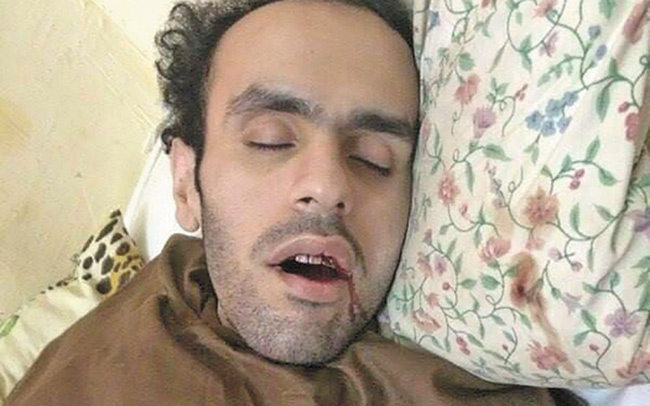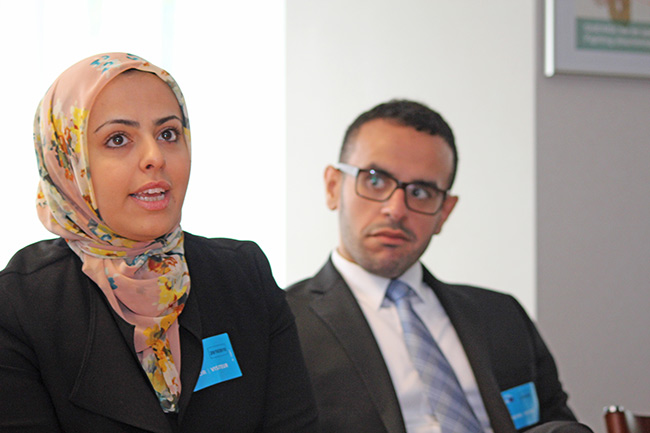1 December 2015 Edition
‘I’m living proof that diplomatic pressure works’
Freed Egyptian hunger striker Mohamed Soltan talks to Mark Moloney in Brussels

• Mohamed Soltan speaks to reporters in Brussels as part of a delegation calling for the release of Irish teenager Ibrahim Halawa
During his hunger strike he almost died nine times due to hyperglycemic seizures, diabetic comas and pulmonary embolisms
“I’M LIVING PROOF that diplomatic pressure works,” says Mohamed Soltan. The 27-year-old US citizen was released from an Egyptian prison on 31 May after spending almost two years as a political prisoner and enduring a 400-day hunger strike. During his hunger strike he almost died nine times due to hyperglycemic seizures, diabetic comas and pulmonary embolisms. Doctors kept him alive with intravenous injections of fluids and sugar.
Born in Egypt in 1988, Mohamed’s family moved to the United States in the mid-1990s. In 2012, after graduating from Ohio State University, he moved back to Egypt and began working for a petrol company. His family were supporters of President Mohamed Morsi and his father served in the new administration. After the overthrow of the democratically-elected government by the Egyptian military, he took part in the huge demonstrations in Cairo against the coup.
In many ways his story mirrors that of Irish teenager Ibrahim Halawa – with one crucial difference. In Mohamed’s case, the US Government came down hard on the Egyptians for the release of their citizen due to a widespread publicity campaign and public outcry. The Irish Government has played mute.
Mohamed was initially arrested in a raid on his family home in Cairo. The arrest came shortly after he was shot in the arm while speaking to a news team as police cleared a protest camp at al-Adawiya Square. As he is bilingual, he frequently helped foreign journalists with their reports. He underwent an operation in which two metal pins and a plate had been inserted in his arm to help heal a shattered bone:
“They came to my father’s home looking for him. But because he wasn’t there they arrested me and three journalists I was speaking to at the time. They kidnapped us for two days and put us in a building they called ‘The Fridge’ while they cooked up an arrest warrant.”
Under Egyptian law, after 15 days of being held without charge, a person must be released or their detention extended. Mohamed was there almost 20 days and told the authorities he must now be released. “The response from the prosecutor was: ‘This is my country and we can do whatever the hell we want. We can bend whatever rules we want to bend.’”

• A leaked photo shows Mohamed Soltan after suffering a seizure while on hunger strike
Mohamed would eventually be charged with being part of an anti-Government conspiracy, alongside the three journalists. His father, Salah, was arrested a short time later and is currently on Death Row.
“In the first prison, when we arrived we were made run between two lines of guards who beat us with batons, belts and chains,” says Mohamed.
“Then they took us into a large reception room where we were made strip to our underwear. I was still wearing my sling and was beaten on my broken arm for two straight hours. The result was the pins moved so that, every time I moved my shoulder, one of the pins ripped through the deltoid muscle. There was complete medical neglect.”
He says he pleaded with the US Embassy to force the authorities to provide medical assistance but it was ignored. Eventually a fellow inmate who was a medical doctor carried out an impromptu medical procedure:
“Without anasthesia he opened up my arm with a bathroom pliers and removed the rods while other prisoners held me down.”
Mohamed said the absolute chaos within the Egyptian military regime, and the inability for anybody to seek a fair trial, forced him to make a stand.
“There was simply no way to deal with the Egyptian state in a rational way. That’s what drove me to start a hunger strike.”
Constant physical and psychological torture played a huge role in his decision.
“There was enforced sleep deprivation and I was placed in solitary confinement. Some guards would come and talk to me about suicide. Then at night they would pass me razor blades under the door and start telling me ‘End your misery and ours!’ and start telling me where I should cut. It was systematic psychological torture and I am still only recovering from it.”

• Hanaa Soltan speaks of the campaign she organised for her brother Mohamed's (right) release
As pressure built up outside for his release thanks to a prominent publicity campaign by his sister, Hanaa, authorities moved his father to the same prison.
“They would start doing similar things to him and then tell me about it. It was torture by proxy,” says Mohamed.
He says the campaign for his release forced the Egyptian regime to act.
“The only thing that works with a regime like the one in Egypt is pressure. If pressure isn’t exerted then they do not act. This is what I went through under US Embassy supervision, so I can only imagine what Ibrhim Halawa and the 40,000 other political prisoners are going through,” he says.
“We’re talking about an Irish citizen [Ibrahaim Halawa] who is in conditions which no human being should face. Me being here today is proof that something can be done. When civil society, NGOs and media put enough pressure on Government officials to act, it worked. Australian journalist Peter Greste is out too because of that kind of pressure.”




